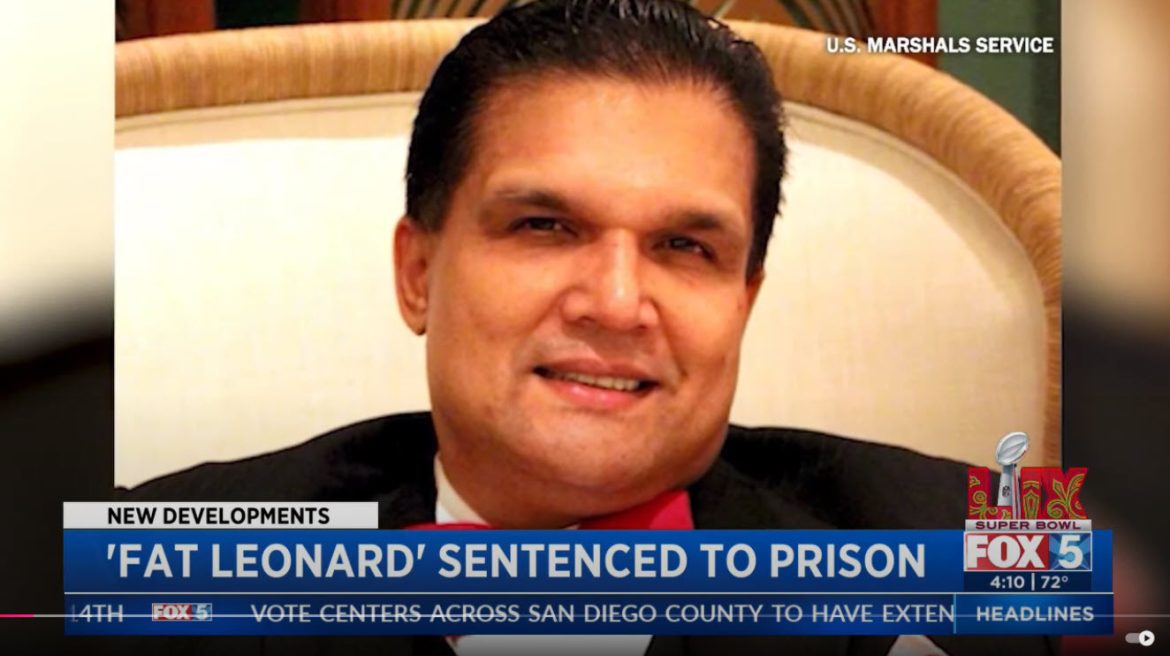Leonard Glenn Francis, infamously known as “Fat Leonard,” has been sentenced to six and a half years in prison for masterminding one of the most extensive bribery scandals in U.S. Navy history. This high-profile case, which has gripped military and legal circles for nearly a decade, revealed a vast network of corruption within the Navy, with dozens of officers and officials implicated in accepting bribes in exchange for classified information, port services, and other favors.
The sentencing brings to a close a saga that exposed widespread misconduct, as Francis, a Malaysian defense contractor, used his influence and wealth to manipulate U.S. Navy operations in the Pacific for years. His company, Glenn Defense Marine Asia (GDMA), held numerous contracts with the U.S. Navy to supply ships with services like fuel, food, and waste removal at various Asian ports. Francis exploited his position to inflate prices and overbill the Navy by millions of dollars, securing enormous profits for himself and his associates.
Details of the Scandal and Charges
Francis, who earned his nickname due to his imposing physique, masterminded a scheme to bribe Navy officials with lavish gifts, luxury travel, and even the services of sex workers. In return, these officers provided GDMA with sensitive information about ship movements and steered contracts towards his company, sometimes even altering routes to ports where GDMA operated, allowing Francis to continue overcharging the Navy for services.
The case, which became public in 2013, led to the investigation and indictment of over 30 Navy officials and contractors. These officers received expensive watches, gourmet meals, and stays at luxury hotels, among other perks. In some cases, Francis also arranged extravagant parties featuring entertainment and escort services, ensuring the loyalty of his Navy contacts. Court documents reveal that Francis reaped millions from the scheme, which, according to prosecutors, cost the Navy at least $35 million in fraudulent expenses.
Francis pleaded guilty in 2015 to charges including bribery and conspiracy to defraud the United States. However, his sentencing was delayed for years as he cooperated with authorities, providing testimony that led to convictions of other Navy officials involved in the scandal.
Leonard Francis’s Flight and Capture
In a twist that shocked law enforcement, Francis escaped from house arrest in San Diego in 2022, just weeks before he was originally set to be sentenced. With his electronic ankle monitor removed, Francis fled to Mexico and evaded authorities for several days, ultimately making his way to Venezuela. He was eventually captured by Venezuelan authorities at the Caracas airport as he prepared to board a flight to Russia, ending his brief time on the run.
His escape raised questions about security and accountability, as well as renewed interest in the case that had nearly reached a conclusion. U.S. authorities worked closely with international law enforcement agencies to secure Francis’s extradition back to the United States, ensuring he would face sentencing.
Impact on the Navy and Calls for Reform
The “Fat Leonard” scandal exposed vulnerabilities within the Navy’s contracting system and a lack of oversight in dealings with private contractors. The revelations shook the Navy, leading to disciplinary actions against numerous officers and a reassessment of procurement practices. For years, GDMA was embedded within Navy operations, benefiting from a lack of scrutiny in its billing and service contracts. In response, the Navy has implemented stricter protocols for contractor relationships and increased transparency measures to prevent similar misconduct.
Acting Navy Secretary Thomas Harker described the case as a “betrayal of trust” that undermined the reputation of the Navy. “This scandal is a stark reminder of the need for accountability at all levels,” he said. The fallout has spurred significant changes within Navy operations, including more rigorous vetting of contractors and enhanced monitoring of officer-contractor interactions.
Leonard Francis Sentenced, but Fallout Continues
The judge overseeing the case handed down the sentence of six and a half years, taking into consideration Francis’s extensive cooperation with authorities that helped bring others to justice. However, Judge Janis Sammartino emphasized that the sentence reflects the severe breach of trust and integrity Francis committed by exploiting his access to military officials.
Francis, who had been in poor health, addressed the court with an apology, acknowledging the damage he caused to the Navy and the trust placed in him. His lawyers argued for leniency, citing his cooperation, health conditions, and the fact that he had already spent years under house arrest, which they argued should count as time served.
While Francis’s sentence marks the end of his role in the scandal, investigations continue as authorities pursue additional cases tied to GDMA’s network of bribes and manipulation. Some of the implicated Navy officials have been tried and sentenced, while others still await trial. The scandal has left a lasting impact on Navy procurement and oversight practices, with reforms aimed at safeguarding the integrity of military operations and preventing similar abuses of power.
The case remains one of the most notorious instances of military corruption in recent U.S. history, serving as a cautionary tale of the consequences of unchecked influence within government contracting.



